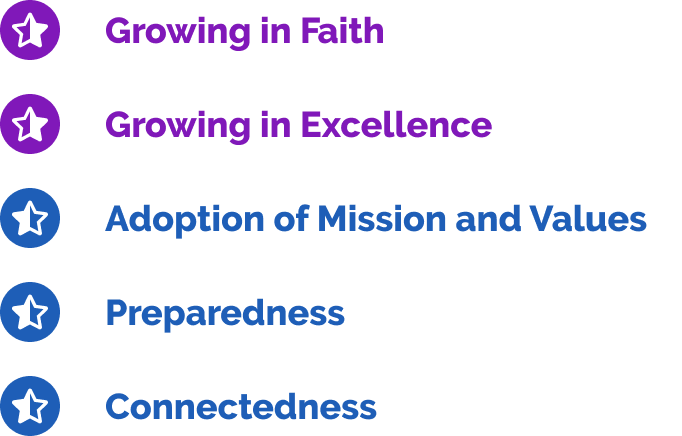Introducing the LeadUp Framework and How Volunteer Culture Impacts Everything Else
Sam was the Operations Director at a mid-sized church. They’d spent a lot of time and effort to create an engaging experience for visitors and “on the fence”, longterm attenders. After some serious work, they had a clear assimilation process with a pathway to connect to the church and engaging worship gatherings.
What they also had was a big open back door.
Despite their efforts to keep people engaged in their church, they found they were losing people and folks were slipping through the cracks. As ministry leaders, that hurts a lot.
If you’ve experienced this phenomenon (and most leaders have), then you know that it can be one of the most frustrating problems to solve. That’s because there are so many potential reasons for this issue.
Is it the preaching? The music? The facility? Are people not feeling loved or welcomed? Are you not helping people grow spiritually?
One thing leaders rarely identify as a reason for ministry challenges is their volunteer culture. However, volunteer culture is potentially one of the most impactful things you can work on.
I’m going to expand on that idea, show you what Scripture has to say about it, give you some ways to focus on volunteer culture in your own church, evaluate the health of your existing volunteer culture, and introduce you to the LeadUp Framework.
Key Scripture
Before we get to the practical side of this discussion, I want you to see God’s view. The Bible talks about volunteer culture, even though it doesn’t use that exact language.
Romans 12, especially verses 3-8, discusses the nature of the Body of Christ regarding working together. Paul says we are one body and each person is a member of that body, all working together as part of the whole.
The members of the body should conduct themselves in humility toward one another (v 3), recognize their unique role in the body (v 4), and realize they belong to one another (v 5). And each member should exercise their gift as their unique service to the body (vv 6-8).
How the Body of Christ Works Together
As one body, we should be working together in harmony, toward one purpose. To do that, your volunteer organization needs unity in several areas.

You need a unified vision, vocabulary, and values. For every member to be able to depend on the other members, you need to ensure every member is fully prepared for the job. And to make sure those members are working together, they need to be connected to one another.
Those elements are the roots of your volunteer culture. They are the elements that work to produce fruit in your ministry, increasing excellence and growing faith.
I’ll go into more depth about these five elements, what I’ll later define as markers, in another chapter.
Key Concepts Regarding Volunteer Culture: Accidental vs Intentional
Most people think that organizational culture is something you have or don’t have. The reality is that every organization has a unique culture.
Your culture exists in the conversations you have with your team and the conversations they have with one another. You see culture in how your people respond to change or how faithful they are to serve or how they interact with parents.
Culture is revealed when your team is pushed during hard seasons like Christmas and Easter. You see it in the reactions of your team when you have to make needed changes.
Every organization, including each volunteer team inside your organization, has a culture. The question is whether that culture is accidental or intentional.
Accidental Culture
Accidental culture is what your team becomes when you’re not being intentional. It’s usually not very healthy.
An accidental volunteer culture will be heavily influenced by the “lowest common denominator”, shaped by fear, only functions in the week-to-week and rarely looks into the future, and becomes more defined by rules than by anything else.
A “lowest common denominator” phrase might sound like, “How many volunteers do we need to be able to fill each role on a Sunday?” Instead try, “How many volunteers can we lead well on a Sunday?”
When fear shapes your decisions, you might find yourself choosing curriculum that doesn’t challenge your leaders because you’re afraid they won’t prepare before Sunday. Instead, choose curriculum that will have the greatest impact and communicate high expectations for weekly pre-Sunday preparation.
A week-to-week ministry can’t see past this coming Sunday and only communicates immediate needs to the team. Instead, schedule your year and give yourself a plan that includes what to say and do in the months leading up to each event and change.
A volunteer team that’s becoming more and more rule-defined is also becoming less fun to be a part of. People don’t typically like rules. Instead, solve problems through better communication of clear and compelling values.
Intentional Culture
Just like no athlete becomes a professional by accident, great teams don’t form a thriving culture by accident. They work with intentionality to create the culture they want.
Great athletes have a plan designed to get them where they want to be. Just the same, great teams have a plan they follow to build a thriving culture.
That plan looks different for every church and team because every team’s culture will look different. However, every pathway to a thriving culture involves some of the same elements.
Intentional cultures all share some common traits and outcomes.
- They have a shared vocabulary that is laced into every conversation and communication.
- They have clear values that each person knows and that resonates throughout the team.
- They are prepared and connected beyond a weekly email from the ministry leader.
- Each person can usually point to their participation on the team as a source of personal growth.
Developing an intentional culture takes a lot of work. Much of the time, that work feels fruitless as you work on clear communication, compelling team environments, and developing people 1-on-1, much of which doesn’t provide immediate payoff.
Intentional culture development also brings pushback from longtime team members. You’re changing something and people don’t generally like change. You’ll need to spend time in conversations explaining your vision over and over to see progress in those people that resist change.
Whether your culture is accidental or intentional, it’s there and shapes every interaction your church people have.
Every visitor, parent, and kid can feel your volunteer culture when they show up, even if they can’t put their finger on what’s special or why they don’t feel like returning the following Sunday to visit again.
Where You Often See These Key Concepts in Ministry
Just about any significant issue or opportunity in your church is impacted by your church’s internal culture. Aside from the pastor’s sermon, I can’t think of a single thing that can’t be improved by first improving your organizational culture.
- Pastoral staff overwhelmed and burning out? Better development and delegation will give staff more margin in their week-to-week operations.
- Worship feeling stale or disorganized? Better preparation, both practically and spiritually, on behalf of your worship leaders (every person on stage) will result in a better Sunday morning environment.
- Having difficulty connecting with church attenders throughout the week? Better connection to one another on Sundays means people will engage together through the week both digitally and in-person.
- Poor participation in small groups? Better equipping of small group leaders should lead to better follow-up with visitors and more “stickiness” in your groups.
- Too few volunteers each Sunday? Better team dynamics should result in your volunteers becoming your best recruiters.
- Parents concerned about their kids’ safety? Better training with your room leaders should result in more orderly rooms and more meaningful interactions with parents at dropoff and pickup.
- Finding that your children’s ministry is missing that “it” factor? Better expression of values related to fun and joy should result in kids having more fun.
- Low energy from the congregation on Sundays? Better attitudes from greeters and ushers should rub off on those attending.
- Visitors expressing that they find it hard to plug-in? Better systems for assimilation that are connected to real people should make visitors feel more welcome.
- Church members not inviting their friends and neighbors? Better expression of values related to “invest and invite” should result in better word-of-mouth.
What Other Leaders Say
I’m under no illusion that I have all the answers about volunteer culture in ministry. I have some experience and I’ve learned a ton from hundreds of conversations with ministry leaders, but I still only bring one perspective.
So I asked for some help from other leaders. The question I posed was, “How does your volunteer culture impact other areas of your ministry?” I got some incredible responses.
Ashlea Davis
Good culture is volunteers hopping out of seats to let a new family sit together. Or high-fiving a bunch of kids at the door so they come in grinning and feeling recognized & loved. Maybe remembering the names of people you spoke to last week so seeing them again brings a big smile and a “Hi Jeff! It’s awesome to see you guys again!”
Good Volunteer culture is knowing that what you do, no matter how small, can help someone else come to know God better. That’s really the ultimate goal. All of our fancy stuff doesn’t matter if we aren’t excited to love & serve others for Jesus Christ.
Nicole Lyons
When the team is in a healthy state, the entire church feels healthy and energetic. This energy is genuine and it can’t help but to overflow from the healthy hearts of those serving.
This impact is created from the top down. The leaders of the serve teams must continue to dig deeper into God’s Word and find resources and stories to create and share the “why” of the culture.
Justin Broome
I feel like volunteer culture is a result of the vision for volunteers that exists in a church. If your vision for your volunteers is to have a team of people who accomplish tasks, then your culture will be very task and process-oriented, with little consideration of the actual giftings of the person filling the role.
If, however, you have a vision for a team of people who come together and use their gifts the way they have been wired to meet needs that are perfectly suited for their personality and their giftings, then you have a culture that values people over tasks and now you have the foundation for a healthy church. Oh, and a healthy volunteer culture too.
Kristen Robinson
I’ll give a go on two aspects of culture that are important to me. Gospel: we want to clearly share the gospel every week with kids, but we want to equip parents with every resource to be the primary disciple maker. Fun: I believe that it is imperative to provide a fun environment for kids. I feel like the best indicators of this are how our 4th and 5th grade boys view church. If they want to come to church then that’s a win for us.
If our volunteers don’t engage both of these parts of our culture we won’t have near the impact we could.
Jeanette Yates
I think volunteer culture is huge for every aspect of ministry. When the opportunities are not framed in the context of serving the kingdom of God, then that moves out into the hospitality, giving, and even caring for the campus.
Volunteers who are just assigned and not equipped with training that includes proper focus on where they are in their own faith journey can lead to burn out, resentment, and distancing in their own fellowship with others.
Self-evaluation
When I’ve learned something new or been challenged by a reminder of something I’ve known but forgotten, I always like to do a brief self-evaluation. Of course, the best lessons are also clear enough for me to use it as a measuring stick against my own experience.
As you think through your own self-evaluation of your team’s volunteer culture, I want you to look at the five elements above in the Intentional Culture section. I’ve converted those elements into simple questions for self-evaluation.
- Do you have well-known and heavily used shared vocabulary that permeates the conversations on your team?
- Does your team operate from clear values that are repeated often?
- Are your team members prepared, both practically and spiritually, to serve each week?
- Is your team connected to one another beyond the time they spend serving together?
- Are your people growing personally in demonstrable ways as a result of their participation on your team?
Honest answers to these simple questions will help you to pinpoint where you need work. However, they’re not great at telling you what you need to do next. We’ll get to that in the future, so join our email list to get alerted as new chapters are released on our blog.
What Success Looks Like

Volunteer culture is so nebulous and undefinable that it’s hard to paint a clear picture of what it looks like. But, as I said before, you can feel it.
Of course, you can’t aim for a feeling. You need something more tangible and actionable, something you can use as a guide and a measuring stick.
That’s why we’ve developed the LeadUp Framework. LeadUp consists of five “health markers”, each with specific expressions of how that marker is fleshed out and well-defined systems designed to give you the tools to make it happen.
In the next chapter, I’m going to go deeper into the LeadUp Framework and I’ll show you how the five health markers fit together to build a thriving volunteer culture. You’ll also get a more complete idea of what next steps you can take toward building your own ministry dream team.
Train church volunteers and disciples online, easy.
Use our simple on-demand video training courses to equip volunteers, develop leaders, and teach disciples. Create your own training or use our video library. Our training automation platform makes it simple and fast to get your people ready for ministry.
Other Posts You May Like
All Growth Begins with Self-Awareness
My first year on the YouVersion Bible App team was exciting and challenging. I joined the team to help with partnerships and community-building. Like any new job, the first year came with a learning curve and the need to pick up new skills. I had never been part of a technology team before, so I…
Is Your Leadership Style Helping or Hurting You?
Your leadership style — how you make decisions, connect with and influence others, delegate, handle conflict, cast vision — is shaped by many factors. Your family history and work experience, along with your personality and internal wiring, impact how you think about and “do” leadership today. Leaders we have worked with, for better or worse,…
A Church Is Only As Healthy As Its Team
When you joined the team at your church, what kind of training did you get in the first weeks? Did you have an HR meeting to cover the health insurance and retirement accounts? Did you cover how to submit an expense report or reserve a room on the master calendar? How about how to handle…



